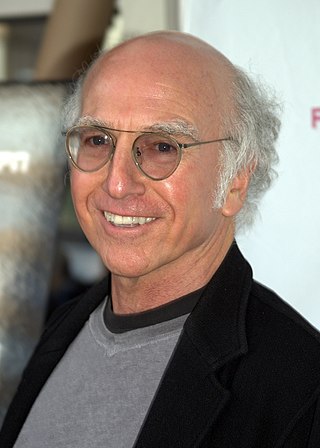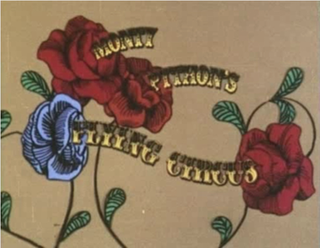
John Marwood Cleese is an English actor, comedian, screenwriter, producer, and presenter. Emerging from the Cambridge Footlights in the 1960s, he first achieved success at the Edinburgh Festival Fringe and as a scriptwriter and performer on The Frost Report. In the late 1960s, he cofounded Monty Python, the comedy troupe responsible for the sketch show Monty Python's Flying Circus. Along with his Python costars Terry Gilliam, Eric Idle, Terry Jones, Michael Palin, and Graham Chapman, Cleese starred in Monty Python films, which include Monty Python and the Holy Grail (1975), Life of Brian (1979), and The Meaning of Life (1983).

Sir Michael Edward Palin is an English actor, comedian, writer, and television presenter. He was a member of the Monty Python comedy group. He received the BAFTA Fellowship in 2013 and was knighted by Queen Elizabeth II in 2019.

Neon Genesis Evangelion, also known as Evangelion or Eva, is a Japanese mecha anime television series produced by Gainax, animated by Tatsunoko, and directed by Hideaki Anno. It was broadcast on TV Tokyo from October 1995 to March 1996.

Lawrence Gene David is an American comedian, writer, actor, and television producer. He and Jerry Seinfeld created the NBC television sitcom Seinfeld, of which David was head writer and executive producer for the first seven seasons. He gained further recognition for creating and writing the HBO series Curb Your Enthusiasm, in which he also stars as a fictionalized version of himself. David's work on Seinfeld won him two Primetime Emmy Awards in 1993, for Outstanding Comedy Series and Outstanding Individual Achievement in Writing in a Comedy Series; he was nominated 17 other times.
British humour carries a strong element of satire aimed at the absurdity of everyday life. Common themes include sarcasm, tongue-in-cheek, banter, insults, self-deprecation, taboo subjects, puns, innuendo, wit, and the British class system. These are often accompanied by a deadpan delivery which is present throughout the British sense of humour. It may be used to bury emotions in a way that seems unkind in the eyes of other cultures. Jokes are told about everything and almost no subject is off-limits, though a lack of subtlety when discussing controversial issues is sometimes considered insensitive. Many British comedy series have become successful internationally, serving as a representation of British culture to overseas audiences.
The satire boom was the output of a generation of British satirical writers, journalists and performers at the beginning of the 1960s. The satire boom is often regarded as having begun with the first performance of Beyond the Fringe on 22 August 1960 and ending around December 1963 with the cancellation of the BBC TV show That Was The Week That Was. The figures most closely identified with the satire boom are Peter Cook, John Bird, John Fortune, David Frost, Dudley Moore, Bernard Levin and Richard Ingrams. Many figures who found celebrity through the satire boom went on to establish subsequently more serious careers as writers including Alan Bennett (drama), Jonathan Miller (polymathic), and Paul Foot.
John Du Prez is a British musician, conductor and composer. He was a member of the 1980s salsa-driven pop band Modern Romance and has since written several film scores including Oxford Blues (1984), Once Bitten, Teenage Mutant Ninja Turtles (1990), and the final Carry On film, Carry On Columbus (1992). He contributed to The Wild (2006) soundtrack.
"The Pony Remark" is the second episode of the second season of the American sitcom Seinfeld, and the seventh episode overall. The episode was written by series co-creators Jerry Seinfeld and Larry David, based on a remark David once made.
Postmodernist film is a classification for works that articulate the themes and ideas of postmodernism through the medium of cinema. Some of the goals of postmodernist film are to subvert the mainstream conventions of narrative structure and characterization, and to test the audience's suspension of disbelief. Typically, such films also break down the cultural divide between high and low art and often upend typical portrayals of gender, race, class, genre, and time with the goal of creating something that does not abide by traditional narrative expression.

Monty Python's Flying Circus is a British surreal sketch comedy series created by and starring Graham Chapman, John Cleese, Eric Idle, Terry Jones, Michael Palin, and Terry Gilliam, who became known collectively as "Monty Python", or the "Pythons". The first episode was recorded at the BBC on 7 September 1969 and premiered on 5 October on BBC1, with 45 episodes airing over four series from 1969 to 1974, plus two episodes for German TV. A feature film adaptation of several sketches, And Now for Something Completely Different, was released in 1971.
The themes of Neon Genesis Evangelion have been the subject of continued casual and academic debate since the Japanese media franchise was created by Gainax. In Japan, a national debate about the anime Neon Genesis Evangelion resulted in widespread coverage of the show's endings and its retellings, contributing to the interest in academic analysis of the show. Most of the franchise features an apocalyptic mecha action story, which revolves around the efforts by the paramilitary organization NERV to fight hostile beings called Angels, using giant humanoids called Evangelions that are piloted by select teenagers. The psychological, religious, and philosophical themes explored in the work represent the majority of the discussion. Evangelion's influence in postmodern apocalyptic narratives on the "sekaikei" genre has been great, but it remains the most successful example.

Mason "Dipper" Pines is a fictional character and one of the two lead characters in the Disney Channel/Disney XD animated series Gravity Falls. The character is voiced by Jason Ritter, and is loosely based on the childhood of series creator Alex Hirsch. Dipper is the only character to appear in all the episodes of Gravity Falls. Beside his presence in the main series, he appears in the Gravity Falls mini-series "Dipper's Guide to the Unexplained", "Fixin' it with Soos", and "Mabel's Guide to Life", as well as the books Gravity Falls: Lost Legends and The Book of Bill.
Rick and Morty is an American adult animated science fiction sitcom created by Justin Roiland and Dan Harmon for Cartoon Network's nighttime programming block Adult Swim. The series follows the misadventures of Rick Sanchez, a cynical mad scientist, and his good-hearted but fretful grandson Morty Smith, who split their time between domestic life and interdimensional adventures that take place across an infinite number of realities, often traveling to other planets and dimensions through portals and on Rick's flying saucer. The general concept of Rick and Morty relies on two conflicting scenarios: domestic family drama and a misanthropic grandfather dragging his grandson into hijinks.
Rick and Morty is an American animated science-fiction comedy franchise, whose eponymous duo consists of Rick Sanchez and Morty Smith. Rick and Morty were created by cartoonist Justin Roiland for a 2006 parody film of Back to the Future for Channel 101, a short film festival co-founded by Dan Harmon. After six years, the sketch was developed into Rick and Morty, a half-hour prime time show that was a hit for Adult Swim, receiving universal acclaim across all seasons. Alongside the original television series, the characters of the show have been featured in a variety of media, including spin-offs, comic books, musical releases and video games. The show has earned hundreds of millions of dollars in income across their merchandising and media franchise.





